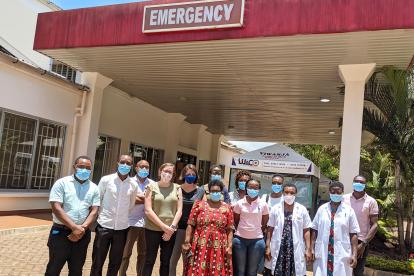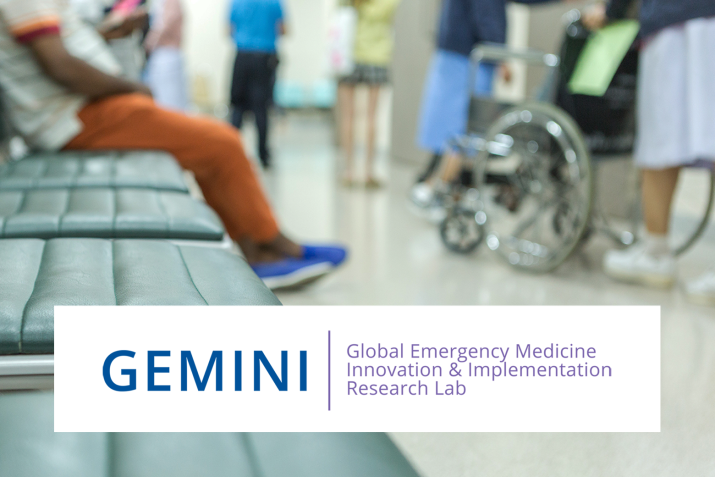In most parts of the United States and other high-income countries, an accident or medical emergency triggers a sophisticated system of responses. An ambulance is dispatched, and specialists trained in emergency care assemble to assess and treat the most acute medical issues.
This is not the case in many low- and middle-income countries, where emergency medical services may be incomplete or nonexistent. And with many of those countries’ populations rapidly growing, the demands on all forms of healthcare are only increasing, widening inequities in access to care.
Addressing this situation is the mission of a new research and training center, officially launched Dec. 1 by the Duke Global Health Institute and the Duke School of Medicine’s Division of Emergency Medicine, part of the Department of Surgery.
Called the Global Emergency Medicine Innovation and Implementation Research Center, or GEMINI, it will seek to improve global emergency medicine through research, capacity building and implementation of data-driven innovations to improve access to and equity of care.
“Our center has two missions: conduct research and build capacity,” says Catherine Staton, M.D., an associate professor of surgery and global health who will co-direct the new center. “Our center is not a ladder of faculty and learners from Duke, but a roundtable of collaborators where we equitably share experiences, knowledge and expertise.”
Staton describes emergency medicine as a “safety net” for communities, providing critical pre-hospital care for patients with injuries and acute medical issues. She says emergency departments also provide care for patients who aren’t able to access it in other ways, making emergency medicine a critical piece of achieving health equity for vulnerable populations.
But gaps in emergency care are widespread, even in the U.S., she notes. Some patients suffer delays in care due to limited access to emergency medical services such as 911. Some hospitals don’t have an emergency department, and many that do are understaffed or inadequately resourced to meet the needs of the populations they serve.
“It’s a global problem, but each location needs a tailored approach,” she says.
Advances in data science are making such tailored approaches more identifiable and scalable, says João Ricardo Vissoci, Ph.D., an assistant professor of surgery and global health who will co-direct GEMINI with Staton.
“A lot of our work has been in the space of translating data science approaches to meaningful interventions,” he says. “Merging implementation science and data science is a way to bridge this gap, facilitating the development of data-driven solutions that are culturally and clinically relevant.”
GEMINI, which will be the first academic research center focused on global emergency medicine, builds on a strong foundation of global work in Duke’s Division of Emergency Medicine. Staton has spent nearly 20 years on the ground in low-resource communities, researching trauma and injury care, health systems and quality of care. A major focus of her research efforts during the past decade has been creating strategies to prevent alcohol-related injuries in Tanzania.
Vissoci has actively worked in Brazil, Tanzania and Uganda assessing population health, health systems, and access to care. He also focuses on traumatic brain injury, mental health, and its interface with technology and data science.
“This center will allow us to concentrate these efforts and serve as a hub for other similar initiatives across DGHI, building the capacity for such efforts,” he says.
Staton says GEMINI’s work will fill three gaps: supporting data science related to trauma incidence and care; building capacity for learners to do innovative research; and creating a network of collaborators who will encourage opportunities for partnerships and exchange of ideas.

DGHI's global emergency medicine...
Interested in Joining GEMINI?
GEMINI is currently recruiting faculty and staff. Faculty who have a research interest in global health, access to quality and timely care, and implementation of data science are encouraged to consider becoming part of the center. Faculty will be given affiliation status and have unique opportunities to collaborate and learn.
Students who have an interest in implementation science and data science will be able to work with the Center’s global faculty and staff. Graduate level, doctoral students, and post-docs will gain experience in conducting, supervising, mentoring, and participating in research opportunities, and have the opportunity to participate in relevant courses and seminar series.
Faculty and students with an interest in GEMINI can contact Staton to learn more.



